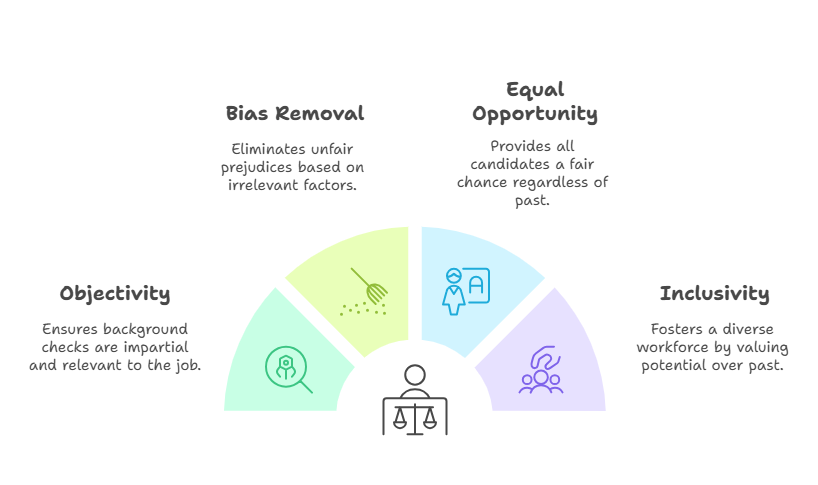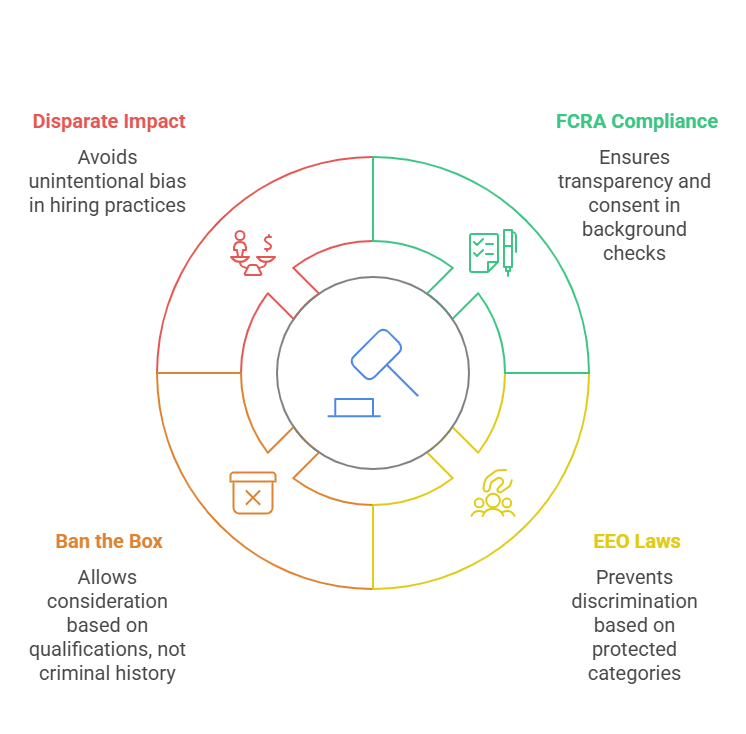Understanding the Importance of Fair Background Checks in Hiring
Fair background checks play a critical role in the hiring process, allowing employers to make informed decisions while ensuring that job candidates are treated with equality and respect. These checks help employers verify the qualifications, experience, and history of potential employees, but they must be conducted in a way that is unbiased and accurate to promote fairness. When background checks are performed equitably, they support a more inclusive hiring process that enables businesses to tap into a broader talent pool, free from discrimination based on race, gender, or past mistakes.
In today’s job market, where diversity and inclusion are more important than ever, conducting fair background checks is essential. They not only allow employers to assess a candidate’s suitability for a role but also foster trust between employers and applicants. A fair background check evaluates an individual’s qualifications and capabilities without unfairly penalizing them for past mistakes or irrelevant factors.
Types of Background Checks
There are various types of background checks used in the hiring process, and each one serves a specific purpose. These checks must be fair and transparent to ensure that all candidates are evaluated on equal grounds. Here are the most common types:
- Criminal Background Checks: Employers often conduct criminal background checks to determine whether a candidate has a criminal history. These checks help employers assess potential risks to the company and workplace. However, it’s crucial that these checks are carried out fairly, meaning minor or outdated offenses should not disqualify candidates if they are not relevant to the position.
- Credit History Checks: Used primarily for positions with financial responsibilities, credit history checks give employers insight into how an applicant handles their finances. When conducted fairly, these checks should consider the applicant’s overall financial situation and not be biased toward candidates with past financial struggles or medical debts.
- Employment History Checks: Employment history checks verify past job experience, confirming that candidates have the relevant background for the position they are applying for. Fairness here means accurately reviewing work history without penalizing candidates for gaps or changes in employment that were out of their control.
- Education Verification: This type of background check confirms the applicant’s educational qualifications and degrees. Fairly conducted education checks ensure that candidates are not unfairly disqualified for non-traditional educational paths or institutions that may be seen as less reputable.
The Role of Fairness in Background Checks

Fairness in background checks is essential for removing biases that can affect the hiring process. Whether it’s a criminal history that may have been long resolved or a credit issue due to personal hardship, these checks must be objective and focused on relevant factors. Fair background checks prevent employers from making biased decisions based on race, gender, socioeconomic status, or other irrelevant factors, promoting an inclusive approach to hiring.
The fairness of a background check is key to ensuring equal opportunity. For example, a criminal history that occurred many years ago and does not affect the candidate’s ability to do the job should not automatically disqualify them. Similarly, someone who has faced financial hardship due to a medical emergency should not be held back from a job due to a past poor credit score, especially if that score is unrelated to the role they are applying for.
Fair background checks contribute to a hiring process that values the candidate’s potential over past mistakes, fostering a more diverse and inclusive workforce. They help eliminate discrimination, empower job seekers to be considered based on their qualifications, and provide businesses with the best talent available.
Data Table: How Background Checks Contribute to an Equitable Hiring Process
Here’s a comparison of how the different types of background checks are conducted and their impact on fairness in the hiring process:
| Type of Background Check | How It Supports Fair Hiring Practices | Impact on Hiring Decisions |
|---|---|---|
| Criminal Background Check | Assesses the relevance and age of offenses before making a decision | Promotes fair consideration, especially for minor offenses |
| Credit History Check | Views financial struggles within context (e.g., medical debt) | Ensures fairness for financially struggling candidates |
| Employment History Check | Verifies experience, accounting for gaps due to personal reasons | Evaluates work experience and achievements without bias |
| Education Verification | Validates education history and credentials without bias toward non-traditional education paths | Ensures that all educational backgrounds are considered fairly |
When background checks are conducted fairly, both candidates and employers benefit. Candidates are given an equal opportunity to demonstrate their skills and qualifications, while employers can make informed decisions based on relevant data rather than biased assumptions. Fair background checks lead to a more equitable future by helping remove barriers to employment, promoting diversity, and ensuring that all applicants are given the same opportunity to succeed.
The Benefits of Fair Background Checks: Why RapidhireSolutions Stands Out
Fair background checks are essential for businesses aiming to create an equitable workplace. However, the quality of background check providers varies, which can significantly impact the fairness of the process. In this section, we’ll compare RapidhireSolutions with competitors to highlight why RapidhireSolutions stands out as a provider of fair and efficient background checks.
Here’s a comparison table that evaluates RapidhireSolutions and other background check providers based on several key factors:
| Feature/Provider | RapidhireSolutions ✅ | Competitor 1 ❌ | Competitor 2 ❌ |
|---|---|---|---|
| Accuracy of Reports | ✅ High accuracy | ❌Moderate | ❌ Low |
| Turnaround Time | ✅ 24 hours | ❌ 7-10 days | ❌ 10-15 days |
| Legal Compliance | ✅ FCRA, EEOC compliant | ❌ Limited compliance | ❌ Limited compliance |
| Fairness in Process | ✅ Impartial, unbiased | ❌ Risk of bias | ❌ Potential bias |
| Customer Support | ✅ 24/7 support | ❌ Business hours only | ❌ Limited support |
| Pricing Transparency | ✅ Clear pricing | ❌ Hidden fees | ❌ Complicated pricing |
About RapidhireSolutions
RapidhireSolutions is committed to providing fair background checks by adhering to all relevant legal and regulatory requirements, including the Fair Credit Reporting Act (FCRA) and Equal Employment Opportunity (EEO) guidelines. By offering transparent pricing, rapid turnaround times, and unbiased reporting, RapidhireSolutions ensures that businesses have the tools they need to make informed and equitable hiring decisions.
What sets RapidhireSolutions apart is its commitment to fairness. The company ensures that background checks are impartial, taking into account the relevance of the information rather than automatically disqualifying candidates based on past mistakes or personal hardships. Whether it’s a criminal record, credit history, or employment background, RapidhireSolutions approaches each background check with fairness and accuracy in mind.
Data Table of Services
Here’s a comparison of RapidhireSolutions with competitors, focusing on key aspects like turnaround time, pricing, and customer satisfaction:
| Feature | RapidhireSolutions ✅ | Competitor 1 ❌ | Competitor 2 ❌ |
|---|---|---|---|
| Turnaround Time | 24 hours | 7-10 days | 10-15 days |
| Pricing Transparency | Transparent pricing | Hidden fees | Complicated pricing |
| Fairness of Background Checks | Fully impartial | Potential biases | Inconsistent |
| Legal Compliance | Fully compliant (FCRA, EEOC) | Limited compliance | Limited compliance |
| Customer Satisfaction | High | Moderate | Low |
Analysis: Why RapidhireSolutions Is the Best Choice
RapidhireSolutions stands out because of its commitment to fairness, speed, and legal compliance. When compared to competitors, RapidhireSolutions offers a quicker turnaround time, with results typically provided within 24 hours, making it ideal for businesses that need fast and accurate information. Competitors, on the other hand, may take several days, causing unnecessary delays in the hiring process.
Furthermore, RapidhireSolutions ensures fairness by adhering to strict legal standards and avoiding biases that may negatively affect candidates. Its impartiality is crucial in ensuring that hiring decisions are made based on relevant qualifications, rather than unfairly disqualifying candidates due to irrelevant or outdated information. The company’s transparent pricing model also allows businesses to understand exactly what they are paying for, which is often not the case with competitors who may include hidden fees.
Detailed Pros and Cons of RapidhireSolutions
Advantages of RapidhireSolutions:
- Fast Turnaround Time: Background checks are completed within 24 hours, allowing businesses to make quick decisions.
- Impartial Reporting: Fair and unbiased checks ensure that all candidates are considered equally.
- Legal Compliance: Fully compliant with FCRA and EEOC regulations, ensuring that background checks are conducted legally and fairly.
- Customer Support: 24/7 customer support ensures any issues are addressed promptly, providing businesses with peace of mind.
- Transparent Pricing: Clear and upfront pricing, with no hidden fees, makes it easy for businesses to budget for background check services.
Disadvantages of Competitors:
- Longer Turnaround Time: Many competitors take up to 10-15 days to complete background checks, which can slow down the hiring process.
- Risk of Bias: Some competitors may have reporting methods that risk unfairly disqualifying candidates based on irrelevant factors.
- Limited Compliance: Certain competitors may not be fully compliant with all relevant regulations, exposing businesses to potential legal risks.
- Hidden Fees: Competitors often have complex pricing structures that may include hidden fees, making it difficult for businesses to anticipate costs.
RapidhireSolutions is the clear choice for companies that want to ensure fairness, speed, and accuracy in their background check process. Its comprehensive approach to background checks provides businesses with the information they need to make informed hiring decisions while promoting an equitable future in hiring.


